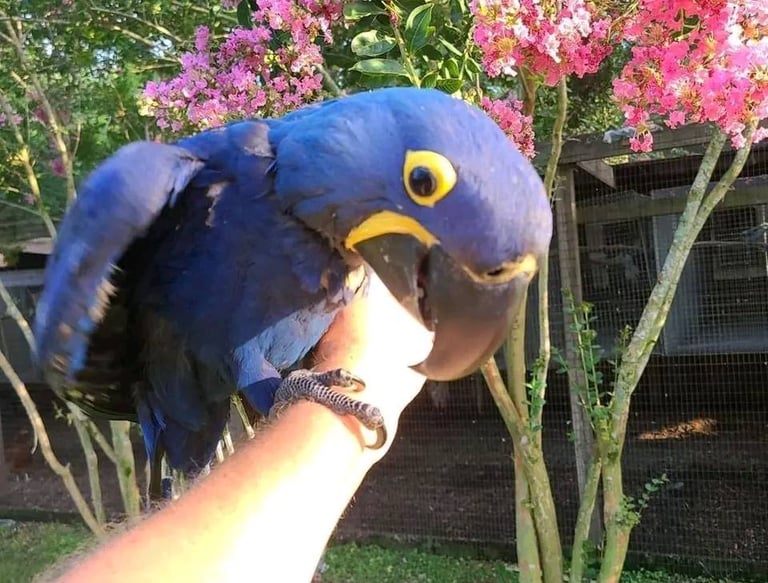Hyacinth Macaw Parrot as Pet.
Are Hyacinth Macaws Good Pets?
Hyacinth Macaws can make excellent pets for experienced bird owners who can provide the necessary space, socialization, and specialized care these birds require. Known for their friendly and gentle nature, they form strong bonds with their caregivers and can be affectionate companions. However, their size, strength, and potential noise levels may not be suitable for all living situations or owners.
Hyacinth Macaws are stunning, intelligent, and affectionate birds that can make wonderful pets for the right owner. Before you decide to bring one of these gentle giants into your life, it’s essential to understand their unique care requirements, costs, and potential challenges. In this article, we’ll explore everything you need to know about owning a Hyacinth Macaw as a pet.
Characteristic - Detail Scientific Name: ------- Anodorhynchus hyacinthinus Size: ------------------ Up to 40 inches (100 cm) in length Weight: --------------- 2.6 to 3.7 lbs (1.2 to 1.7 kg) Lifespan: -------------- 40 to 60 years Talking Ability: --------- Moderate Noise Level: ------------ Moderate to loud
Can Hyacinth Macaws Live With Other Pets and Birds?
Hyacinth Macaws can get along with other pets and birds if introduced and supervised carefully. However, due to their size and strength, it’s essential to monitor interactions closely to ensure the safety of all animals involved. When housing multiple birds together, it’s crucial to provide ample space, separate feeding areas, and plenty of toys and perches to prevent territorial disputes and aggression.
Are Hyacinth Macaws Legal to Have as Pets?
In most countries, including the United States, it is legal to own a Hyacinth Macaw as a pet. However, due to their vulnerable status in the wild, there may be specific permits, documentation, and regulations required for legal ownership. It’s essential to check your local laws and regulations before acquiring a Hyacinth Macaw to ensure compliance and responsible pet ownership.
Are Hyacinth Macaws Social?
Yes, Hyacinth Macaws are highly social creatures that thrive on interaction with their caregivers and other birds. They form strong bonds with their human family members and enjoy spending time playing, cuddling, and engaging in activities together. If left alone for extended periods, these parrots can become bored, stressed, and potentially develop behavioral issues. To ensure their well-being, it’s crucial to provide consistent socialization and mental stimulation for your Hyacinth Macaw.
Speech and Noise of Hyacinth Macaws.
Hyacinth Macaws have moderate talking abilities and can mimic a range of sounds, including human speech, with practice and patience. They are not considered the best talkers among parrot species but can be quite adept at learning words and phrases. In addition to their talking abilities, Hyacinth Macaws can produce loud vocalizations, such as squawks and screams. These noises can be disruptive in certain living situations, so potential owners should be prepared for a moderate to loud noise level.
Toys & Interaction
Hyacinth macaws can also be destructive. They demand a lot of wooden toys or branches to chew on. If not, they’ll start to mouth you or the precious items around your home. These macaws seem to enjoy learning and spending time with humans. However, because they are social, they need interaction to keep them busy and out of trouble. Neglected birds that are stuck in their cages for days on end often end up screaming, mutilating themselves, and destroying the environment around them. You’ll have to make sure they aren’t plucking their feathers out from boredom. If you spend long hours at work, these are not the pets for you.
Hyacinth macaw Diet
The diet of the hyacinth macaw consists of some of the hardest nuts in the world. To crack these nuts, hyacinth macaws have incredibly strong beaks that can deliver a bite with more than 300 pounds of pressure per square inch. They mainly prefer nuts from Mucuja palm trees and bocaiúva (macaúba) palm trees, but their beaks are strong enough to crack open Brazil nut pods, coconuts, and macadamia nuts.
Because of their eating habits, hyacinth macaws play a vital role in their ecosystems especially in the wild. Hyacinth macaws crack open these nuts and feast on the kernels inside, allowing the seeds to spread as they fly. Because so few other creatures can open these nuts, these plants rely on hyacinth macaws to spread their seeds to other parts of the forest.
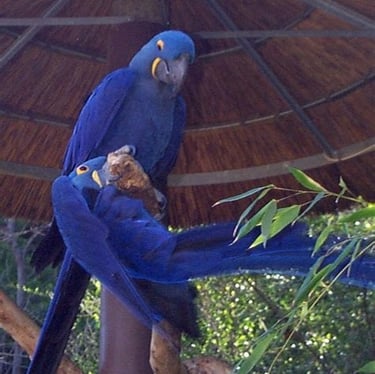

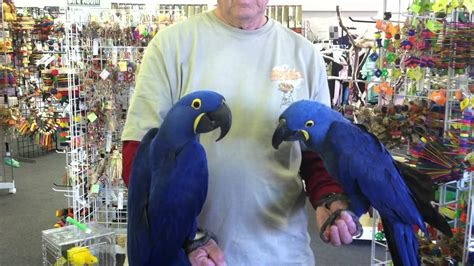

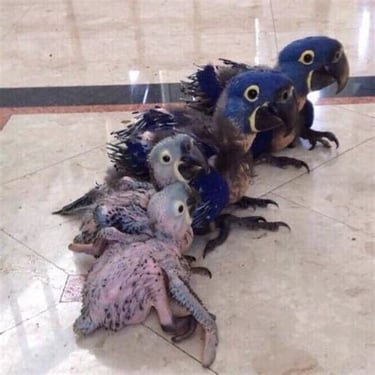
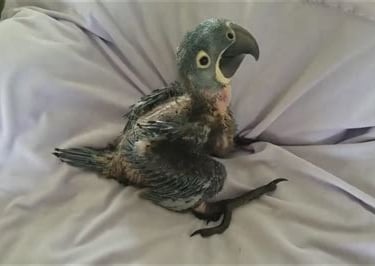
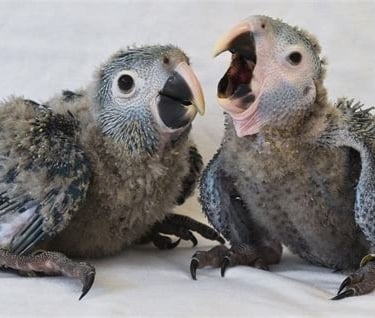
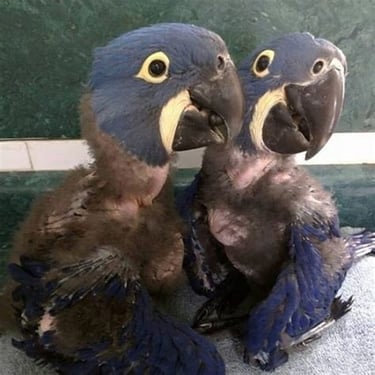
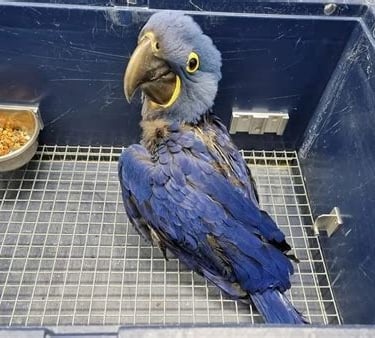


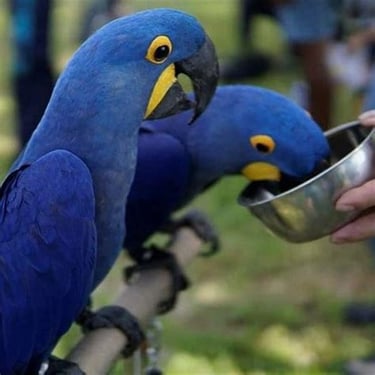
Fun Facts
The hyacinth macaw is the largest macaw species. These macaws frequently travel together in small flocks of 1–8 pairs, and loudly call to one another. Macaw pairs remained bonded.
In the wild, macaws often flock to mountains of clay known as "macaw licks."
When disturbed, these bright birds screech loudly and circle overhead with their long tails streaming. Macaws are playful and inquisitive and are able to mimic human vocalizations very well.
Macaws are able to reach flight speeds of up to 56 kph (35 mph).
Macaws eat palm nuts only after the nuts have passed through the digestive system of a cow.
